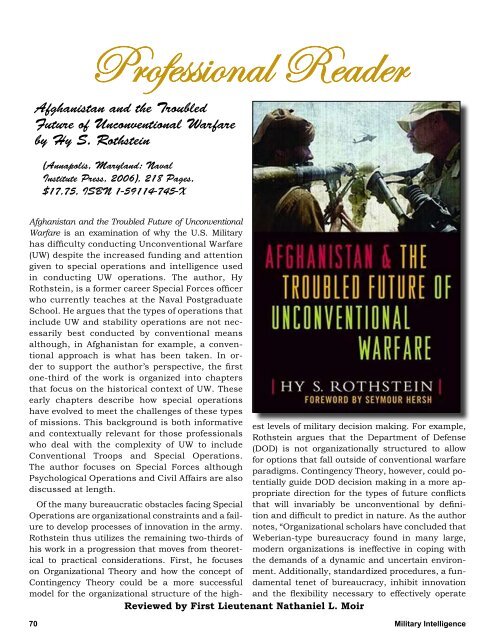Military Intelligence Professional Bulletin - Federation of American ...
Military Intelligence Professional Bulletin - Federation of American ...
Military Intelligence Professional Bulletin - Federation of American ...
You also want an ePaper? Increase the reach of your titles
YUMPU automatically turns print PDFs into web optimized ePapers that Google loves.
<strong>Pr<strong>of</strong>essional</strong> Reader<br />
Afghanistan and the Troubled<br />
Future <strong>of</strong> Unconventional Warfare<br />
by Hy S. Rothstein<br />
(Annapolis, Maryland: Naval<br />
Institute Press, 2006), 218 Pages,<br />
$17,75, ISBN 1-59114-745-X<br />
Afghanistan and the Troubled Future <strong>of</strong> Unconventional<br />
Warfare is an examination <strong>of</strong> why the U.S. <strong>Military</strong><br />
has difficulty conducting Unconventional Warfare<br />
(UW) despite the increased funding and attention<br />
given to special operations and intelligence used<br />
in conducting UW operations. The author, Hy<br />
Rothstein, is a former career Special Forces <strong>of</strong>ficer<br />
who currently teaches at the Naval Postgraduate<br />
School. He argues that the types <strong>of</strong> operations that<br />
include UW and stability operations are not necessarily<br />
best conducted by conventional means<br />
although, in Afghanistan for example, a conventional<br />
approach is what has been taken. In order<br />
to support the author’s perspective, the first<br />
one-third <strong>of</strong> the work is organized into chapters<br />
that focus on the historical context <strong>of</strong> UW. These<br />
early chapters describe how special operations<br />
have evolved to meet the challenges <strong>of</strong> these types<br />
<strong>of</strong> missions. This background is both informative<br />
and contextually relevant for those pr<strong>of</strong>essionals<br />
who deal with the complexity <strong>of</strong> UW to include<br />
Conventional Troops and Special Operations.<br />
The author focuses on Special Forces although<br />
Psychological Operations and Civil Affairs are also<br />
discussed at length.<br />
Of the many bureaucratic obstacles facing Special<br />
Operations are organizational constraints and a failure<br />
to develop processes <strong>of</strong> innovation in the army.<br />
Rothstein thus utilizes the remaining two-thirds <strong>of</strong><br />
his work in a progression that moves from theoretical<br />
to practical considerations. First, he focuses<br />
on Organizational Theory and how the concept <strong>of</strong><br />
Contingency Theory could be a more successful<br />
model for the organizational structure <strong>of</strong> the high-<br />
est levels <strong>of</strong> military decision making. For example,<br />
Rothstein argues that the Department <strong>of</strong> Defense<br />
(DOD) is not organizationally structured to allow<br />
for options that fall outside <strong>of</strong> conventional warfare<br />
paradigms. Contingency Theory, however, could potentially<br />
guide DOD decision making in a more appropriate<br />
direction for the types <strong>of</strong> future conflicts<br />
that will invariably be unconventional by definition<br />
and difficult to predict in nature. As the author<br />
notes, “Organizational scholars have concluded that<br />
Weberian-type bureaucracy found in many large,<br />
modern organizations is ineffective in coping with<br />
the demands <strong>of</strong> a dynamic and uncertain environment.<br />
Additionally, standardized procedures, a fundamental<br />
tenet <strong>of</strong> bureaucracy, inhibit innovation<br />
and the flexibility necessary to effectively operate<br />
Reviewed by First Lieutenant Nathaniel L. Moir<br />
70 <strong>Military</strong> <strong>Intelligence</strong>
















